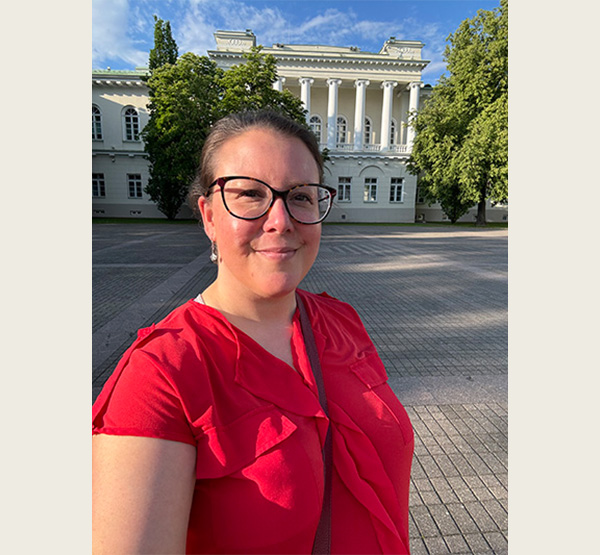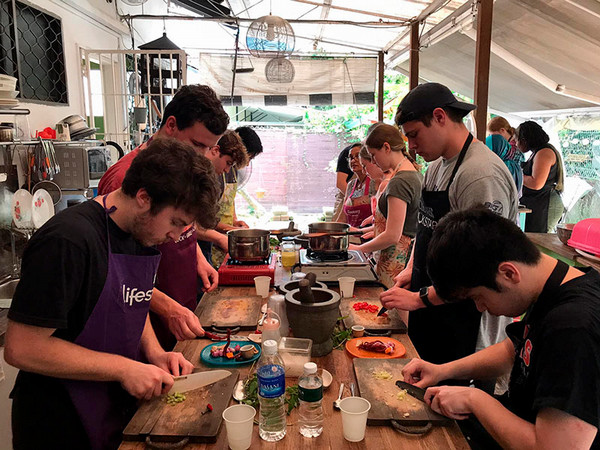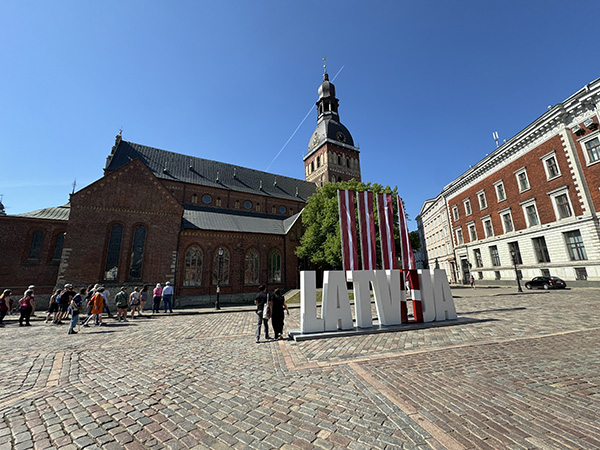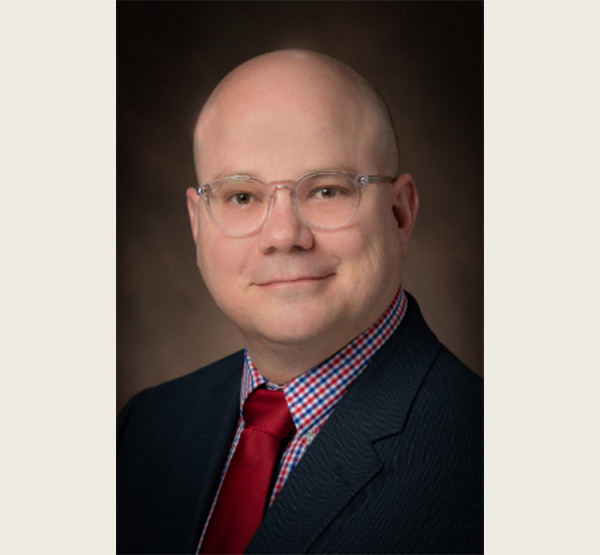Miami University developing a new education abroad program in Lithuania and Latvia
Studying abroad can be a life-changing experience for students
Miami University developing a new education abroad program in Lithuania and Latvia

Two Miami University faculty members have received an Increase and Diversify Education Abroad for U.S. Students (IDEAS) grant to develop a new education abroad program in Lithuania and Latvia.
Rosemary Pennington, chair and associate professor of Media, Journalism, and Film, and Stephen Norris, Walter E. Havighurst Professor and director of the Havighurst Center for East European, Russian, and Eurasian Studies, received the $33,600 IDEAS grant to develop the workshop that will take place next summer.
The grant will be used to cover expenses for Pennington to teach a section of international journalism in the program as well as for her and Norris to travel with the students.
“I had wanted to create a new journalism study abroad program and had originally been thinking of going to Finland, where I have some connections, and possibly Estonia,” she said. “I then reached out to Steve, who suggested Lithuania and Latvia given Havighurst’s connections in those two countries.”
The Havighurst Center for East European, Russian, and Eurasian Studies created a Lithuania Program in 2018. Led by Norris’ colleague, Neringa Klumbyte, professor of Anthropology, the program holds an annual lecture on Lithuania, sponsors Miami’s Lithuanian Club, and offers financial support to Miami students studying in the Baltic region.
Klumbyte also has led two summer workshops to the Baltics, and Miami’s Russian-language students have attended the Russian Winter School at Tallinn University for several years.
“When she and I co-created the Lithuania Program, we both hoped that other faculty members would consider taking students to the region,” Norris said. “Rosemary’s interest has allowed us to tap into these existing partnerships and expand them in very important ways.”

Traveling abroad has many benefits
Miami students travel to 55-plus countries during winter term and other times throughout the year, said Karla Guinigundo, director of Global Partnerships. The majority of Miami students who study abroad do so on faculty-led programs (67% in 2023).Cheryl Young, associate vice president of Global Initiatives, said the value of education abroad for students is found in “the enhanced learning experience focused on an intensive opportunity with expert faculty who provide in-depth knowledge and enrich the program with their insights.”
Young pointed to research from the CASSIE (Comparative Analysis of Student Success in International Education) that focused on how education abroad influences academic outcomes, personal growth, and professional development.
Key findings included:
- Enhanced academic performance — higher GPAs and better retention rates.
- Time to graduation — students are more likely to complete their degree requirements on schedule.
- Critical thinking and problem solving — exposure to different academic environments and cultures contributes to development of skills.
- Cultural competence — enhanced cultural sensitivity.
- Personal development — increased self-confidence, independence, and adaptability.
- Global awareness — better understanding of the role as a global citizen.
Pennington and Norris hope students gain a lot from this opportunity to study abroad in Lithuania and Latvia.
“For me, I want them to have a chance to really think about the importance of journalism to democracy. In both Lithuania and Latvia after the end of the Cold War, the growth of independent news outlets helped facilitate the development of democratic norms in the countries,” Pennington said.
“They are regularly ranked as some of the best places for journalism in the world. We talk a lot about the importance of journalism for democracy in the United States, but I think it’s important students have a chance to explore that in other contexts.”
Norris echoed that sentiment.
“Lithuania and Latvia both have important journalists working on topics that should interest Miami students: the role of NATO and the EU (European Union), Russian aggression in Ukraine, and how former Soviet republics have created viable democracies,” Norris said. “In addition, many Russian journalists and political opposition leaders have moved to Lithuania and Latvia to continue their reporting on Putin’s Russia.”
Norris added, “We’ll meet with a wide range of these journalists as well as some important politicians. For example, Svitlana Tsikhanouskaya, the Belarusian opposition leader, now lives in Vilnius. She delivered last year’s Havighurst Lecture, and our students will have the chance to meet with her and her team.”

Leading students in education abroad programs
Both faculty members are looking forward to traveling to that region with Miami students.
“Getting the chance to think about journalism in this context is important to how I approach teaching it back in Oxford,” Pennington said. “It makes my understanding of the profession richer. I’ve also been making connections with journalists and journalism professors in the countries, and I’m hoping to build more partnerships in the future to benefit Miami University journalism students.”
Pennington recently traveled to the region, where she spent nearly two weeks in Vilnius in Lithuania and Riga in Latvia.
“The trip was partly to allow me to become more familiar with those cities, to get a sense of where I want to take the students, and to feel more comfortable leading them there,” Pennington said. She also met with faculty from Vilnius University and some journalists who are helping them make connections in the cities.
Norris has not visited the region since Russia’s invasion of Ukraine in 2022, “so I am sure it will be eye-opening to see how that event has changed the Baltic Republics,” he said. “As a historian of the region with a particular interest in historical memory, I am also looking forward to visiting new museums and memorial sites that have opened since the last time I was in Vilnius and Riga in 2016.”
Both Global Initiatives and the Havighurst Center provided funds to support the site visit. Norris said he’s fortunate to direct a center that has funding sources for students and faculty seeking to study the former Soviet Union.
“Rosemary’s interest in leading a summer workshop came at a time when the center has had to rethink where to send students," he said. "With Russia no longer a possibility because of Putin’s war, the Baltics have become even more important to how we fulfill the Havighurst Center’s mission."

Gaining a global perspective
Studying abroad can provide “life-changing experiences” for students, said Pennington, who as a journalism student took part in a 10-day exchange to Berlin, Germany, over winter break.
“Going on that trip gave me the confidence to explore other opportunities — I interned with CNN in London, England, right after I graduated — that I simply would not have considered or felt confident pursuing before that first short trip.”
She added, “I know that for many of the students I took to (John E. Dolibois European Center) MUDEC, they came back changed individuals, with deeper understandings of the world. I try to encourage all my students to consider study abroad, and if a student says they want to do it, I will often try to help them find funds to help them cover the costs. I think it’s so important, I wish every student could go.”
Norris agreed, saying his professional career was a result of his own study abroad experiences. He was able to study in London for a semester through an IES program sponsored by his undergraduate institution.
“I was also incredibly fortunate to take two winter trips to Russia led by one of my undergraduate professors. The first was in January 1992, just two weeks after Gorbachev resigned. My professional career is entirely a product of that study abroad trip.”
He added, “Aside from military service, no one in my family had ever traveled abroad before me and no one certainly had been able to spend a semester abroad. More than 30 years later, I still draw on that extended time and how much it taught me about the world."